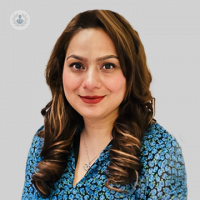Never too late to bloom: an introduction to hypogonadism
Written in association with:Hypogonadism is when sexual glands called the gonads (the testes and the ovaries) fail to produce normal amounts of hormones such as oestrogen, testosterone, and progesterone. This causes the secondary physical sexual characteristics to be underdeveloped or never develop at all. This may also mean that a person who has hypogonadism may face fertility issues or brittle bones. In this article, expert endocrinologist and consultant physician Dr Sobia Arshad explains hypogonadism and its effects on the body.

What causes hypogonadism?
Hypogonadism could be a condition that develops in utero, during the expected puberty period, or as an occurrence later in life due to the effects of lifestyle or other medical conditions. The pituitary gland in the brain (also known as the “master gland”) tells the gonads and other hormone glands in the body what hormones to make and when to release them, which the body will then respond to accordingly. Anywhere along this network, there could be a ”miscommunication” which can cause hypogonadism and other conditions.
There are two main kinds of hypogonadism:
- Primary hypogonadism (hypergonadotropic hypogonadism), where there is an issue with your gonads and they cannot produce the hormones as expected, even though the pituitary gland is sending the message. This can be caused by certain autoimmune, genetic, and developmental disorders.
- Secondary hypogonadism (hypogonadotropic or central hypogonadism), where the pituitary gland is having issues, and the gonads aren’t told to produce hormones and remain unstimulated. This can be caused by eating disorders or lack of nutrients in the diet, certain medications, and bleeding in the brain. Kallmann syndrome is also noted to be a cause.
Both kinds of hypogonadism can be caused by infection, the effects of radiation, and trauma. Menopause is an expected form of hypogonadism in women past the age of 50.
What are the traits of hypogonadism?
The effects of hypogonadism will appear different in males and females.
In females can be the following symptoms:
- menstruation that never happens, is irregular, or halts entirely
- small or lack of breast growth
- hot flashes
In males can be the following symptoms:
- reduced growth of the penis and testes
- a higher voice or a delay in the voice dropping
- abnormal breast growth (gynecomastia)
- muscle loss
- erectile dysfunction
Regardless of sex, there can be the following symptoms:
- lack of sex drive
- osteoporosis
- infertility
- loss or lack of body, facial, and public hair
Is hypogonadism treatable?
Hypogonadism is often diagnosed after a blood test, where doctors will examine the levels of sex hormones in your blood. They will look at the levels of oestrogen, testosterone, follicle-stimulating (FSH) which controls hair growth, and luteinizing hormone (LH) which controls the menstrual cycle. Further tests may include checking sperm count and for anaemia and iron in the blood. If the condition is suspected to be a result of secondary hypogonadism, then doctors will do brain scans such as an MRI or CT to check on the pituitary gland.
For treatment of hypogonadism, it can be as simple as hormone-based therapy. This medication can be administered in the form of injections, gels, patches, or lozenges. If the condition is caused by other medical issues, those will have to be addressed first and thus the treatment plans will differ. For example, if there is a tumour in the pituitary gland, then radiation therapy or surgery may be recommended. Unless caused by a particular secondary issue, hypogonadism is a chronic condition and treatment will be life-long. However, hypogonadism itself is not deadly and the prognosis is normally positive.
For concerns about hormones and endocrine systems, Dr Sobia Arshad is available for consultation via her Top Doctors profile.


